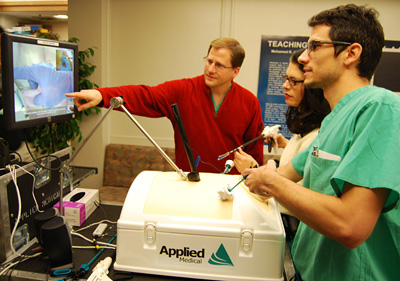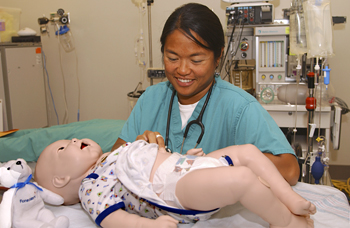The Center for Virtual Care provides a learning environment where surgeons can hone their skills with new technologies.
Posted Feb. 9, 2011
The UC Davis Center for Virtual Care, where patient-simulation and advanced robotics technologies create a virtual hospital environment for health-care learners, has been accredited as a Comprehensive Education Institute by the American College of Surgeons — an honor bestowed on only a handful of simulation centers worldwide.
The accreditation acknowledges the center for offering practicing surgeons, surgical residents, medical students, allied-health professionals, nurses and others exceptional educational opportunities that allow them to maintain their skills and explore new procedures and technologies.
Aaron Bair, associate professor of emergency medicine and director of emergency medicine simulation for the center, said the accreditation is an important acknowledgement of UC Davis' expertise in providing life-saving training to health-care professionals.
"Accreditation by the American College of Surgeons serves as an acknowledgement of the high-quality and multidisciplinary nature of the training opportunities offered by the Center for Virtual Care," Bair said.
"The center gives health-care professionals the opportunity to practice new invasive procedures and emergency medicine interventions before they treat patients," he said.
 "Accreditation by the American College of Surgeons serves as an acknowledgement of the high-quality and multidisciplinary nature of the training opportunities offered by the Center for Virtual Care."
"Accreditation by the American College of Surgeons serves as an acknowledgement of the high-quality and multidisciplinary nature of the training opportunities offered by the Center for Virtual Care."
— Aaron Bair
Elizabeth Bencken, the center's chief administrative officer, said the process of attaining accreditation was rigorous.
"The process involved looking at all the educational courses and related material we provide to ensure that we had clear learning objectives, documented outcomes and long-term expectations regarding the skills and competencies developed," Bencken said.
"The American College of Surgeons reviewed all of our teaching resource materials, from mannequins and task trainers to virtual software. Center for Virtual Care personnel, including administrators, instructors and support staff, provided credentialing documentation. The strong support we received from departments and School of Medicine and hospital officials also contributed to our receiving accreditation," she said.
Based on flight-simulation technology, patient-simulation systems at the center use sophisticated software, video graphics and life-sized mannequins that allow trainees and health-care professionals to respond to real-life patient scenarios and hone their skills.
The simulators, which are programmed to react like real patients, blink, speak, breathe and have heartbeats and other anatomical features, allow students to practice intravenous drug delivery, cardiopulmonary resuscitation (CPR) and airway management, among other procedures, for both adult and pediatric patients. The simulators respond to the actions of each trainee, creating a dynamic and uniquely realistic experience from which to learn.
Other technology housed at the center allows physicians and nurses to train for interventional procedures, such as opening blocked blood vessels for the treatment of heart attacks or renal hypertension, using a patient-simulation system that creates a realistic surgical environment for risk-free training.
Pediatric emergency medicine physician Emily Andrada works with the infant simulator, which is programmed to respond like a real patient.
The center’s advanced robotic technology provides hands-on robotic training for medical residents, faculty and surgeons in the use of new surgical techniques that combine robotics, artificial intelligence and advanced imaging for minimally invasive surgery. In 2010, after using the center's robotic-surgery training equipment to practice a complex procedure, two cardiothoracic surgeons at UC Davis Medical Center performed the first robotic-assisted, multi-arterial cardiac bypass procedure in California. Cardiothoracic surgery is just one of five specialties at the medical center now offering minimally invasive, robotic-assisted procedures for patient care.
The American College of Surgeons is a scientific and educational association of surgeons that was founded in 1913 to improve the quality of care for the surgical patient by setting high standards for surgical education and practice.
UC Davis Health System is advancing the health of patients everywhere by providing excellent patient care, conducting groundbreaking research, fostering innovative, interprofessional education and creating dynamic, productive partnerships with the community. The academic health system includes one of the country's best medical schools, a 645-bed acute-care teaching hospital, an 800-member physician's practice group and the new Betty Irene Moore School of Nursing. It is home to a National Cancer Institute-designated cancer center, an international neurodevelopmental institute, a stem cell institute and a comprehensive children's hospital. Other nationally prominent centers focus on advancing telemedicine, improving vascular care, eliminating health disparities and translating research findings into new treatments for patients. Together, they make UC Davis a hub of innovation that is transforming health for all. For more information, visit healthsystem.ucdavis.edu.

